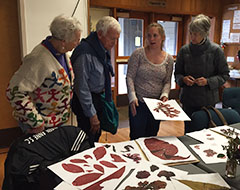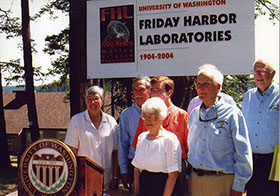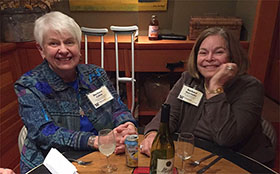FHL's Advancement Board: 20 Years Young!
By Megumi Strathmann & Dennis Willows
There has been a profound transition in the focus of FHL over the past 50 years: back in the day, FHL supported relatively few undergrads. Summer course offerings were focused on topics for professional development of grad students, and the University and FHL Director viewed FHL as a graduate enterprise to train research scientists and teachers, and to promote discovery of new knowledge.
 Several Advancement Board members talking with a student about her algal pressings.
Several Advancement Board members talking with a student about her algal pressings.Support for graduate student applicants came in roughly equal parts from the students themselves, through their advisors or home institutions, or from National Science Foundation or NIH Training Grants anchored at FHL. As time passed, the University of Washington, like many universities nationally, became more dependent upon federal support for research and provided far less in direct financial support to graduate students engaged in research or research training. With this change, it became imperative that new sources of support for tuition, travel, and room/board had to be found.
The basic problem is that students are usually not wealthy, and when they interrupt their urban-campus lives to attend FHL they may lose access to financial aid from their home institutions just when they need extra funding for travel, housing, board, and tuition. Also, FHL course loads require full-time commitments for field work, laboratory research, and independent design and execution of research projects, which makes concurrent part-time jobs impossible.
 Dennis Willows (second from left) at FHL's 100th Anniversary celebration in 2004.
Dennis Willows (second from left) at FHL's 100th Anniversary celebration in 2004.
It became apparent to us in the 1980s that in order to sustain a focus on high-quality research training, we had to do at least 2 things: first, define ways to attract the ‘best and brightest’ student applicants internationally (e.g., new research apprenticeships and continued world-class courses aimed at pre-professionals in marine science), and second, to invest in students by supporting part of their basic costs. For this latter goal, we tried at first to use a simple appeal to FHL alumni for scholarship support. The response was generous from the academic community, but by the 1990s it was clear that basic funding would require large endowments. This is why the FHL Development Advisory Board (now the Advancement Board) was created.
Initially it was a daunting prospect: at that time the University prohibited some activities that are now normal parts of fundraising, especially spending State funds for socializing, and it all seemed a bit sinful! But Patsy Smith and Dennis got very lucky with the first few Board appointments (particularly Bob Lundeen, then recently-retired CEO of Dow Chemical and Tektronix) and Barbara and Tom Cable (vastly experienced organizers of people and energy in the context of fund raising), and before long we had a Development Advisory Board and some excellent progress.
 Barbara Cable (left) and Barbara Von Gehr (right), who were both pivotal in the sustaining of FHL's Advancement Board and are now members emeritus.
Barbara Cable (left) and Barbara Von Gehr (right), who were both pivotal in the sustaining of FHL's Advancement Board and are now members emeritus.
The members of the FHL Advancement Board, from its inception in 1997 through today, have devoted time, effort, and financial acumen to raise funds in order to bring talented young scientists to the Labs. It has created and developed both annual funds and lasting endowments. These scholar- and fellowships allow students not only to come and study, but also to meet students and investigators from other schools and countries. These are the collaborations that lead to global scientific advances and innovations. The Advancement Board’s remarkable efforts to support students and facilities are now essential not only to graduate student training but also to undergraduate and high school student research experiences that have become an intrinsic part of education at FHL.
Congratulations and many thanks to the FHL Advancement Board on its 20th anniversary. May its success continue!



